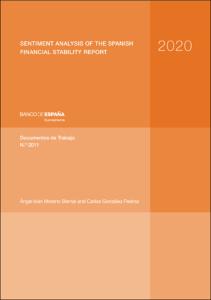Sentiment analysis of the Spanish Financial Stability Report
Autor
Fecha de publicación
24-jul-2020
Descripción física
58 p.
Resumen
En este artículo se muestra una aplicación de la minería de textos para extraer información de documentos financieros y usar esta información para crear índices de sentimiento. En particular, el análisis se centra en los diferentes números del Informe de Estabilidad Financiera (IEF) del Banco de España desde 2002 hasta 2019 en su versión en español, y en la reacción de la prensa a este Informe. Para calcular los índices, se ha creado, hasta donde conocemos, el primer diccionario en español de palabras con connotación positiva, negativa o neutra dentro del contexto de la estabilidad financiera. Se analiza la robustez de los índices aplicándolos a distintas secciones del Informe, y usando diversas variaciones del diccionario y de la definición del índice. Finalmente, se mide también el sentimiento de las noticias de los periódicos los días siguientes a la publicación del Informe. Los resultados muestran que la lista de palabras recogida en el diccionario de referencia constituye una muestra robusta para estimar el sentimiento de estos textos. Esta herramienta constituye un valioso instrumento para analizar la repercusión del IEF, y también para cuantificar de forma objetiva el sentimiento que se está trasladando en él.
This article shows a text mining application to extract information from financial texts and use this information to create sentiment indices. In particular, the analysis focuses on the Banco de España’s financial stability reports from 2002 to 2019 in their Spanish version and on the reaction of the press to these reports. To calculate the indices, the first Spanish dictionary of words with a positive, negative or neutral connotation has been created, as far as we know, within the context of financial stability. The robustness of the indices is analyzed by applying them to different sections of the report, and using different variations of the dictionary and the definition of the index. Finally, sentiment is also measured for newspaper news in the days following the publication of the report. The results show that the list of words collected in the reference dictionary constitutes a robust sample to estimate the sentiment of these texts. This tool constitutes a valuable methodology to analyze the repercussion of financial stability reports, while objectively quantifying the sentiment that is being transferred in them.
This article shows a text mining application to extract information from financial texts and use this information to create sentiment indices. In particular, the analysis focuses on the Banco de España’s financial stability reports from 2002 to 2019 in their Spanish version and on the reaction of the press to these reports. To calculate the indices, the first Spanish dictionary of words with a positive, negative or neutral connotation has been created, as far as we know, within the context of financial stability. The robustness of the indices is analyzed by applying them to different sections of the report, and using different variations of the dictionary and the definition of the index. Finally, sentiment is also measured for newspaper news in the days following the publication of the report. The results show that the list of words collected in the reference dictionary constitutes a robust sample to estimate the sentiment of these texts. This tool constitutes a valuable methodology to analyze the repercussion of financial stability reports, while objectively quantifying the sentiment that is being transferred in them.
Publicado en
Documentos de Trabajo / Banco de España, 2011
Otras versiones
Materias
Minería de textos; Análisis de sentimiento; Procesado de lenguaje natural; Comunicaciones de bancos centrales; Estabilidad financiera; Text mining; Sentiment analysis; Natural language processing; Central bank communications; Financial stability; Regulación y supervisión de instituciones financieras; Sistemas de información y bases de datos; Bancos centrales y otras autoridades monetarias; Técnicas informáticas
Aparece en las colecciones:












